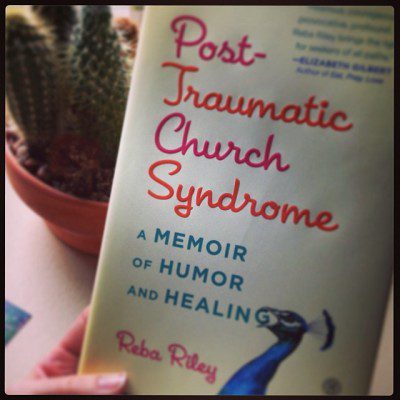I recently posted a review of the new book “Post-Traumatic Church Syndrome.” Since then, I’ve had the privilege of a conversation with author Reba Riley. Here’s some of our discussion about writing, family, and what’s next. It’s the abridged version so YOU’RE WELCOME, because we both really love to chat. If you don’t already have this book on your ‘to-read’ pile, get on it. This is the book your nightstand has been waiting for…
E: This book has got to be resonating with so many people… I know it’s still new, but what kinds of initial response are you getting?
R: It’s been overwhelmingly positive. Actually, the response has been much faster than I thought. Author friends told me it would be at least 2 weeks before you start hearing from people, but really, it was within 24 hours. Like they got the book, read it, and were writing to me. There were times it felt like writing this book took more than I had to give. So to be able to see that is so life-giving. And never again will I read a book and not write to the author! Because that’s why you do it.
E I’ve been telling people, “this book is the real deal, it’s the next big thing.” So I’m hearing responses from friends and readers as they get into it. I got an out-of-the-blue text from a friend the other day and all it said was “I LOVE URBAN MONK!” I also got a message from a church member, and she said “I am 2 chapters in, and I’ve already cried this morning. I recognize that girl.”
R Wow. That makes me cry. That is so powerful. When you’re telling your truest truth, you’re telling the truth for everyone. At least, you HOPE that’s what you’re doing. And that’s why I do it.
E You have captured this kind of vulnerability that is really powerful. Reading it, I never once feel like you’re a victim… You have a strong sense of self underlying everything, and that makes it really accessible and approachable for readers.
R You should have read the first couple drafts. I was victim all over the place! It was hard to strike that balance between getting a sympathetic response and being victim. But it’s the same balance you have to strike in life. You have to be honest and vulnerable about your struggles without just bemoaning them.
E You’ve definitely found that, and it will be empowering for people no matter what their damage is . Like saying, here’s how you can tell your story and claim it…without wallowing. If you started in a place that was really different from that, how did you come into the voice that we see in the finished product?
R It was the 7 drafts. Up until the 4th one everything was shit. On the 4th, it started to change. On the 5th draft I turned a section into my editor—the ‘Winter’ part – and she called me and said ‘you turned a huge corner. You figured something out. I’m not sure what, but now you need to go do that with everything.” I remember thinking –it was winter, when I was writing that “Winter” section, and I thought, “this is going to kill me. I’m caught in this huge snow drift and I’m never going to get out.” But what I learned between the 4th and 5th versions was using dialogue to show instead of tell. Almost like writing fiction. That’s what changed everything.
E Yes, that’s what makes it so compelling too. It reads like a novel. The characters—I hate to say “characters” because they’re actual people but, your mom is a really great character. Your friend is a great character. And there are so many scenes where you capture an image that embodies so many other truths… One of my favorite parts is where you swerve to miss hitting that truck. The religious pamphlets and worship shit all over the floor of your car makes a brilliant snapshot.
R- It’s funny that you would pick that scene out—it was originally the prologue. The headlights are coming toward me and I say “not now, not when I have almost started to find you…” and then it drops the reader off there, not sure if I’m ok or not, and then the first chapter beings. That was there until the 6th draft. But we realized it didn’t work. It was too intense, you have to build up to that… I’ve learned that a big part of storytelling is choosing not just what to talk about, but where to place it.
E As the pastor of progressive church, I see lots of people who have some degree of PTCS. Coming out of whatever background, this place is a kind of sanctuary, in more ways than one. Communion is a big part of that healing here. Throughout the book, you talk about communion as a trigger. Say more about that.
R- In the book, you see that struggle the whole time. Communion is a powerful symbol of unity; but what it meant for me was everything that I’ve lost. It’s one of the more powerful scenes, when I do take communion at the end, it’s so healing. It’s where I redefine something. Which is what I’ve had to do for all kinds of things in my life, and in the book. Communion was me realizing that I could come to the table and I’m letting go of judgment. Letting go of unforgiveness. Embracing people who are here, and beyond here, even those that would judge me. My acceptance of them, whether or not they would accept me. So now, I weep during communion. I love communion. As long as it’s gluten free! At Wild Goose Festival, the first time I went, I got to help Sara Miles prepare communion… It was this whole experience of how life changes you and how different it can be. I was literally crying over the gluten free crackers.
E –You’ve mentioned how difficult writing this was for you… do you have another book in you? Is there a follow up?
R- There is. I mean, it was terrible but also the best thing I’ve ever done. Also, part of why it was so terrible was that my competency was not equal to the task. I had so much to learn, I literally did not know how to be an author. A lot of my pain was getting to that level. I’m sure the next one will be hard, but hopefully not nearly as difficult… I could write from the page after the book ends to today, and it would be an incredible story, but I don’t know the ending. I’m just trying to be present to this project, and present with the people who are reading it.
E What’s your sense of who is reading this book? Are you seeing any trends in age or gender demographics?
R I’m not really sure; but I am hearing from some men around my father’s age, and that was surprising. [I’ve realized] this project is going to take on a life of its own and go places that I haven’t even imagined yet. That’s what art does–you just watch it unfold and see who it will reach. My hopes are for the brokenhearted…the seekers, people who like to laugh, book clubs. But then I hope that people who don’t agree with me read it because they want to understand their children…maybe they won’t like me at all. But if it helps them reconcile or understand their child better, then I feel very grateful for that.
E That is strong stuff… Your mom is such a powerful voice and presence in the book, how has she reacted to the finished product, and how has your family felt about all this being out there?
R My family has been so full of grace through this process. The first months were really a struggle… Finally it came down to, my parents couldn’t deny the changes in my life, and they couldn’t deny that God was in it, even though they didn’t fully understand it. Where they have been so full of grace is—if our pain can be worthwhile for someone else, then they want it out there. And that is such a gift to me, because I would not have written it… my relationship with family was much more important to me than telling a good story… My Dad’s neighbor is reading it right now. She drove by, rolled down the window, said “hey Ralph, you seem so laid back now… how did you ever have a yellow baseball bat that you swung around at Satan??” I think he may have wondered, “what have I done, putting all this out there?” (Laughing)
E Well, I can’t wait to see what you do next.
R What do you want me to do next??
E I’ll think about it… but you’re right that art takes on a life of its own. Whatever you do next is going to be largely shaped by the response you get to this one. Once they know your voice, people will say ‘this is what we need to hear from you now.’
R I’m all ears. I told the Godiverse I would do whatever they tell me, as long as it’s clear.
E People love that word by the way! Where did it come from?
R Somewhere deep in the recesses of my brain!
E It has such a ring of truth to it. It sounds like something we’ve heard before but it’s not, it’s all you. It’s your signature piece! Any parting thoughts?
R Just that writing this book was the hardest and best thing I’ve ever done. And sharing this message of healing is as holy a calling as I can imagine.
Agreed.
You can follow Reba Riley’s blog, “Post-Traumatic Church Syndrome,” on Patheos.













